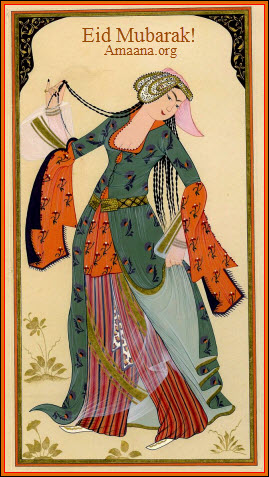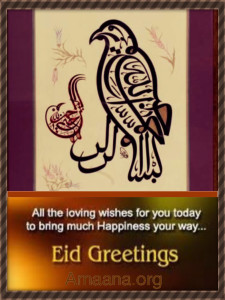 Eid ul Fitr is the culmination of the 30 days of fasting at the end of the sacred month of Ramadan, which is the ninth month of the Islamic lunar calendar. During this month, Muslims focus on devotional and spiritual practices to strengthen their connection with God and these rituals include reading the Holy Quran, prayers for fellow Muslims and for the worldwide community for peace, justice and equality for all humanity. On the 23rd of Ramadan, Layla tul Qadr, the Night of Power, is celebrated. This is the night when Islam was born, when Prophet Muhammad received his first revelation from God via Angel Gabriel which was the first verse of the Quran and he kept getting these messages for 23 years of his life. This year Ramadan started on June 18, 2015 and Eid will be celebrated on Friday July 17th upon sighting of the moon anywhere in the world. As I write this, the moon was sighted in the Gulf countries on July 16th.
Eid ul Fitr is the culmination of the 30 days of fasting at the end of the sacred month of Ramadan, which is the ninth month of the Islamic lunar calendar. During this month, Muslims focus on devotional and spiritual practices to strengthen their connection with God and these rituals include reading the Holy Quran, prayers for fellow Muslims and for the worldwide community for peace, justice and equality for all humanity. On the 23rd of Ramadan, Layla tul Qadr, the Night of Power, is celebrated. This is the night when Islam was born, when Prophet Muhammad received his first revelation from God via Angel Gabriel which was the first verse of the Quran and he kept getting these messages for 23 years of his life. This year Ramadan started on June 18, 2015 and Eid will be celebrated on Friday July 17th upon sighting of the moon anywhere in the world. As I write this, the moon was sighted in the Gulf countries on July 16th.
Eid ul-Fitr is the Arabic name of this religious holiday. Eid meaning “festivity” and Fitr meaning “original nature.” Fitra refers to the returning to our Godly nature, to make our selves worthy of merging with God as we have been created in His image.
You are indeed made of an exalted nature. Wa innaka la’ala khulkin azim. – Quran 68:4
In Turkey it is called Ramazan Bayramı (Ramadan Feast) takes its name from the Ramadan. Şeker Bayramı (Sugar Feast) as a lot of sweet dishes are prepared and served including Baklava and others. The devout celebrate after having completed the month of fasting, charitable giving, pious deeds and prayers successfully and vow to carry on the good and ethical works all year in helping others and bringing about justice, equality and peace. Many Muslims give to charitable organizations to help the less fortunate as they believe that what they give will bring hope and succor to others and God will multiply their abundance manifold. Starting with the morning prayers on the first day of the month of Shawwal, which follows Ramadan, greetings are exchanged by loving and joyous hugs and children are given an Eidi, a gift of money followed by great rejoicing, sharing food and having picnics.
Since I have covered in more details information on Ramadan, Eid, and Layla tul Qadr on my previous articles, I thought I would feature some of the messages from the White House by President Obama, as I have highlighted messages from President Bush and before him President Clinton on my articles at the links below.
 Eid Mubarak! We share our warmest and joyous wishes with you and your families and sincerely pray that wars end all over the world and that no human should need to take another human’s life and with education and understanding we can bring about peace on this earth. We pray that the children of Syria and Palestine should wake up to the sounds or birds in the morning and not bombs. The best Eid present was the Iran nuclear deal was signed. This nuclear agreement should be imposed on every nation on earth as the only reason for nuclear power should be for energy but not for armaments. As President Obama said, Ramadan is a time for spiritual renewal and devotion—a chance to honor a faith known for its diversity and commitment to the dignity of all human beings. Amen!
Eid Mubarak! We share our warmest and joyous wishes with you and your families and sincerely pray that wars end all over the world and that no human should need to take another human’s life and with education and understanding we can bring about peace on this earth. We pray that the children of Syria and Palestine should wake up to the sounds or birds in the morning and not bombs. The best Eid present was the Iran nuclear deal was signed. This nuclear agreement should be imposed on every nation on earth as the only reason for nuclear power should be for energy but not for armaments. As President Obama said, Ramadan is a time for spiritual renewal and devotion—a chance to honor a faith known for its diversity and commitment to the dignity of all human beings. Amen!
Statement by President Obama on the Occasion of Eid-al-Fitr
As Muslims throughout the United States and around the world celebrate Eid-al-Fitr, Michelle and I extend our warmest wishes to them and their families. This last month has been a time of fasting, reflection, spiritual renewal, and service to the less fortunate. While Eid marks the completion of Ramadan, it also celebrates the common values that unite us in our humanity and reinforces the obligations that people of all faiths have to each other, especially those impacted by poverty, conflict, and disease.
In the United States, Eid also reminds us of the many achievements and contributions of Muslim Americans to building the very fabric of our nation and strengthening the core of our democracy. That is why we stand with people of all faiths, here at home and around the world, to protect and advance their rights to prosper, and we welcome their commitment to giving back to their communities.
On behalf of the Administration, we wish Muslims in the United States and around the world a blessed and joyous celebration. Eid Mubarak.
♥
Statement by President Obama on the Occasion of Eid-al-Fitr
Michelle and I extend our warmest wishes to Muslim communities in the United States and around the world as they celebrate Eid-al-Fitr. For Muslims, Ramadan has been a time of fasting, prayer and spiritual renewal. These past four weeks have also been a time to serve the less fortunate — a reminder of the obligations that people of all faiths have to each other.
In the United States, Eid-al-Fitr speaks to the truth that communities of faith — including Muslim Americans — enrich our national life, strengthen our democracy and uphold our freedoms, including the freedom of religion. That is why the we stand with people of all faiths, in the United States and around the world, in protecting and advancing this universal human right.
On behalf of the American people, we congratulate Muslim Americans and Muslims around the world on this joyous day. Eid Mubarak.
♥
♥
Below is the text of a web video from President Obama marking the beginning of Ramadan on August 21, 2009. Video of the President’s message is available HERE.
Ramadan Message
Washington, DC
 Eid and Related Articles
Eid and Related Articles
- Ramadan Page from previous years
- Ramadan Kareem and Eid ul-Fitr – Eid Mubarak!
- Layla tul Qadr – The Night of Power
- Muslim Holidays
- Salwaat Music non-stop for Ramadan
- Ramadan Poems by Rumi
- Abraham and Ishmael – Eid ul Adha – Festival of Offering
- Companionship-on-High
- Islamic lunar calendar
- Prophet Muhammad
- Night of Power – Layla-tul Qadr
- Ramadan Poetry by Rumi
- Layla tul Qadr The Night of Power
- Ramadan Poems by Rumi
- Ramadan and Eid ul Fitr | Ismaili Web Amaana
- Layla tul Qadr – The Night of Power
- Layla tul Qadr – The Night of Power and Destiny
- Ramadan Kareem and Eid ul-Fitr – Eid Mubarak!
- Nowruz Persian New Year – Eid Mubarak!
- Miraj wa Isra – Ascension and Night Journey of Prophet Muhammad
- Ramadan Kareem and Eid ul-Fitr – Eid Mubarak!
- Ramadan and Eid ul Fitr | Ismaili Web Amaana
- Eid ul-Fitr Ramadan Kareem – Eid Mubarak!
- Eid-e Ghadir – Declaration at Gadhir e Khumm
-
Eid ul Adha – Abraham and Ishmael Festival of Offering
- Nowruz Persian New Year – Eid Mubarak!
- Ramadan Page from previous years
- Calendar Converter
Such Magnificent work.
How Ismailism and Ramadan Laila tul Qadar and Eid are connected please explain
best informaçao. http://www.imo-abdulsacoor.com Portugal